|
Books Should Be Free Loyal Books Free Public Domain Audiobooks & eBook Downloads |
|
|
Books Should Be Free Loyal Books Free Public Domain Audiobooks & eBook Downloads |
|
Adventure Books |
|---|
|
Book type:
Sort by:
View by:
|
By: Egerton Ryerson Young (1840-1909) | |
|---|---|
 Three Boys in the Wild North Land
Three Boys in the Wild North Land
| |
 Winter Adventures of Three Boys
Winter Adventures of Three Boys
| |
By: Elbridge Streeter Brooks (1846-1902) | |
|---|---|
 Historic Girls
Historic Girls
Twelve short stories of real girls who have influenced the history of their times. | |
By: Eleanor Luisa Haverfield (1870-) | |
|---|---|
 Queensland Cousins
Queensland Cousins
| |
By: Elijah Kellogg (1813-1901) | |
|---|---|
 Lion Ben of Elm Island
Lion Ben of Elm Island
An adventure story for boys, in which the author aims to "impart pleasure, and, at the same time, inspire respect for labor, integrity and every noble sentiment". There is a sense of nostalgia, as Kellogg sets his story in bygone days, when the grandfathers of his readers were mere boys, facing the challenges and perils of frontier life and developing the character needed to transform the wilderness in to the land of freedom and plenty. - Summary by Lynne Thompson | |
By: Eliza Haywood (1693-1756) | |
|---|---|
 The History of Miss Betsy Thoughtless, Volume 1
The History of Miss Betsy Thoughtless, Volume 1
The flirtations of a rich young maiden, Miss Betsy Thoughtless with several suitors, as she alienates the right man by refusing to take the issue of marriage seriously. Because of this her guardian commits her to marriage to the wrong man, a situation over which she has little control. As the heroine describes her fate, this text exposes the institution of marriage, the powerlessness of women and the double standards held during that time.(Introduction by Joyce Martin) | |
By: Elizabeth Enright (1907-1968) | |
|---|---|
 Return to Gone-Away
Return to Gone-Away
When Portia Blake and her family came back to Gone-Away Lake, it was to move into an old house locked up tightly for nearly half a century. Next to discovering Gone-Away the summer before, nothing so exciting had ever happened to Portia and her cousin Julian. Then began an enchanted summer of exploration and discovery, as the old house slowly revealed its surprises and its treasures. This is the sequel to the book, Gone-Away Lake, by Elizabeth Enright. | |
By: Elizabeth Gaskell (1810-1865) | |
|---|---|
 Moorland Cottage
Moorland Cottage
"Maggie Brown is torn between her mother who constantly tells her to live for her selfish brother (to whom she gives all her love) to her wish to marry Frank and live for herself. Maggie's plight for independence shows the change in women's role, which started to take place during that time. But it also keeps to the tradition of an almost Cinderella story: the pure woman does the best for everyone but herself and is rewarded for that. In addition, this is a very interesting story, written in Gaskell's remarkable style. When you read it, you are transported to another time, and place". | |
By: Elizabeth Gerberding (1857-1902) | |
|---|---|
 Golden Chimney: A Boy's Mine
Golden Chimney: A Boy's Mine
Ben Ralston regrets that he was born 40 years too late to take advantage of the California Gold Rush. Opportunities are dwindling, but for a boy with drive, they are not extinct. - Summary by Lynne Thompson | |
By: Ellen C. Babbitt (1872-) | |
|---|---|
 More Jataka Tales
More Jataka Tales
The continued success of the "Jataka Tales," as retold and published ten years ago, has led to this second and companion volume. Who that has read or told stories to children has not been lured on by the subtle flattery of their cry for "more"? The Jataka tales, regarded as historic in the Third Century B. C., are the oldest collection of folk-lore extant. They come down to us from that dim far-off time when our forebears told tales around the same hearth fire on the roof of the world. | |
By: Elmer Russell Gregor (1878-?) | |
|---|---|
 Running Fox
Running Fox
Having reached the age of sixteen winters, Running Fox, the son of Black Panther, a famous Delaware war-chief, determined to establish his reputation as a warrior. He knew, however, that before he could gain admission into the gallant company of fighting men he would have to prove his courage and ability in some daring exploit. | |
By: Emerson Hough (1857-1923) | |
|---|---|
 Covered Wagon
Covered Wagon
"Look at 'em come, Jesse! More and more! Must be forty or fifty families." This is an old-fashioned adventure tale set on the Oregon Trail, just before the California Gold Rush. It is the story of a wagon train bound for the west, and the conflict which arises due to of a love triangle. Indian fights, buffalo hunts, dangerous river crossings and other dangers of the trail add to a gripping and entertaining yarn. | |
By: Émile Zola (1840-1902) | |
|---|---|
 Mysteries of Marseilles
Mysteries of Marseilles
The elopement of Philippe Cayol, an aspiring liberal, poor and untitled with Blanche De Cazalis, niece of a powerful millionaire and politician sets the stage in this novel full of twists and turns with villains a plenty. Philippe's brother Marius strives to protect the two lovers from the De Cazalis' uncontrolled fury. Although written in his youth Zola's signature style, his indignation about injustice and his vivid characterization of the noble, the wealthy and common man is very evident in this non stop adventure. - Summary by Celine Major | |
By: Emma Orczy (1865-1947) | |
|---|---|
 The League of the Scarlet Pimpernel
The League of the Scarlet Pimpernel
Written by Baroness Orczy and first published in 1919, The League of the Scarlet Pimpernel is a sequel book to the classic adventure tale, The Scarlet Pimpernel. The book consists of eleven short stories about Sir Percy Blakeney’s exploits in rescuing various aristos and French citizens from the clutches of the guillotine. The stories which are listed below, are set in 1793 but appear in no particular order. They occasionally refer to events in other books in the series. | |
By: Eric L. Busby | |
|---|---|
 Star Trek: The Section 31 Files
Star Trek: The Section 31 Files
This collection from Darker Projects brings the Star Trek series back to life with a fictional account of our universe on the brink of war. With stakes running high a splinter group decides to take on the most morally dubious missions and bring us the listeners along for the ride. Sometimes in war there are no good options and this series explores those darker decisions that don't have to be made in everyday life. The story is action packed and goes at light speed jumping around the universe always keeping in the center of the action and outwitting the enemy. | |
 Star Trek: Lost Frontier
Star Trek: Lost Frontier
This story begins after a long and devastating war that has left The Federation in shambles. The pressing mission for the remaining ships in Star Fleet is to travel the war-torn galaxy's and find old alleys to reunite under one federation. Many of the classic Star Trek races make an appearance in this series including the Klingons, Romulans and everyone's favorite the Borg! This book is fast paced and a very creative read. It comes recommended highly for anyone who has followed Star Trek and it also fills in a good amount of background information for those less well versed in the subject. | |
By: Ernest Glanville (1855-1925) | |
|---|---|
 In Search of the Okapi A Story of Adventure in Central Africa
In Search of the Okapi A Story of Adventure in Central Africa
| |
By: Ernest Shackleton | |
|---|---|
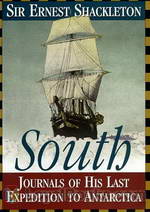 South! The Story of Shackleton's Last Expedition 1914-1917
South! The Story of Shackleton's Last Expedition 1914-1917
The expedition was given the grand title of The Imperial Trans-Antarctic Expedition. Due to be launched in 1914, two ships were to be employed. The first, the lead vessel, fittingly named the Endurance was to transport the team to the Weddell Sea from where the great explorer Ernest Shackleton and five others would cross the icy wastes of Antarctica on foot. The second ship, the Aurora was to approach the continent from the other side and put down supplies at various points to help the explorers... | |
By: Ernest Thompson Seton | |
|---|---|
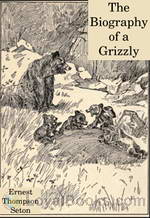 The Biography of a Grizzly
The Biography of a Grizzly
I first read this little book when I was in the fifth grade, and now more than fifty years later, I still find it fascinating. Ernest Thompson Seton was a man with a concern for nature her creatures and an excellent story teller. I could almost feel Wahb, the great grizzly’s pain and frustration as he tried to avoid contact with humans and just be left alone to carry out his bear business. Listening to this audio book will be an hour and a half well spent.Summary by Mike Vendetti, Narrator. | |
By: Ernest William Hornung (1866-1921) | |
|---|---|
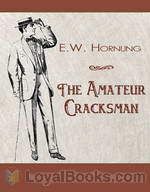 The Amateur Cracksman
The Amateur Cracksman
“I’d tasted blood, and it was all over with me. Why should I work when I could steal? Why settle down to some humdrum uncongenial billet, when excitement, romance, danger and a decent living were all going begging together” – A. J. Raffles, The Ides of March. | |
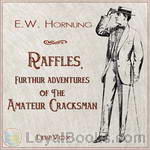 Raffles, Further Adventures of the Amateur Cracksman
Raffles, Further Adventures of the Amateur Cracksman
Raffles, Further Adventures of the Amateur Cracksman (also published as The Black Mask) is the second collection of stories in the Raffles series. After the dark turn of events at the end of The Gift of the Emperor, Bunny’s done his time and, his life not being quite what it was before, now finds himself longing for the companionship of his Raffles. | |
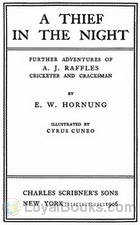 A Thief in the Night
A Thief in the Night
Gentleman thief A.J. Raffles burgles his way through a series of homes in late Victorian England. A Thief in the Night is a short story collection and Hornung's third book in the Raffles series. | |
 Mr. Justice Raffles
Mr. Justice Raffles
A. J. Raffles is a British gentleman thief of some renown who, in this, the hero's final adventure, ironically demonstrates a sense of morality by teaching a London East End loan shark a lesson. The book was later made into a movie, as well as a British television series. | |
By: Erskine Childers (1870-1922) | |
|---|---|
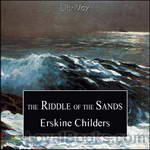 The Riddle of the Sands
The Riddle of the Sands
Containing many realistic details based on Childers’ own sailing trips along the German North Sea coast, the book is the retelling of a yachting expedition in the early 20th century combined with an adventurous spy story. It was one of the early invasion novels which predicted war with Germany and called for British preparedness. The plot involves the uncovering of secret German preparations for an invasion of the United Kingdom. It is often called the first modern spy novel, although others are as well, it was certainly very influential in the genre and for its time... | |
By: Ethel C. Pedley (1859-1898) | |
|---|---|
 Dot and the Kangaroo
Dot and the Kangaroo
Dot and the Kangaroo, written in 1899, is a children’s book by Ethel C. Pedley about a little girl named Dot who gets lost in the Australian outback and is eventually befriended by a kangaroo and several other marsupials. | |
By: Ethel Twycross Foster (1881-1963) | |
|---|---|
 Little Tales of the Desert
Little Tales of the Desert
A six year-old girl named Mary spends Christmas vacation with her parents in the Arizona desert of 1901 or thereabouts. | |
By: Eugène Sue (1804-1857) | |
|---|---|
 The Mysteries of Paris, Volume 1
The Mysteries of Paris, Volume 1
The Mysteries of Paris (French: Les Mystères de Paris) is a novel by Eugène Sue which was published serially in Journal des débats from June 19, 1842 until October 15, 1843. Les Mystères de Paris singlehandedly increased the circulation of Journal des débats. There has been lots of talk on the origins of the French novel of the 19th century: Stendhal, Balzac, Dumas, Gautier, Sand or Hugo. One often forgets Eugène Sue. Still, The Mysteries of Paris occupies a unique space in the birth of this... | |
By: Eva K. Betz (1897-1968) | |
|---|---|
 Knight of Molokai
Knight of Molokai
Hurricane! Volcano eruptions and fire! Leprosy! Nothing deterred Father Damien from doing the work to which he had been called. Outstandingly big and strong as a boy, he was notably kind as a young man. He needed all his strength and kindness when he went to live at the leper colony of Molokai.This children’s biography of Father Damien of Molokai was written by Eva K. Betz, a prolific Catholic writer of history and biography books for children. (Introduction from an original dust jacket and Maria Therese) | |
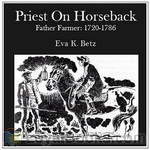 Priest on Horseback - Father Farmer: 1720 - 1786
Priest on Horseback - Father Farmer: 1720 - 1786
A historical novel for children, which tells the story of several months in the life of the then famous Father Farmer, as he traveled a Mass circuit in Pre-Revolutionary, Colonial America. He faced much danger and and adventure, in order to provide the Mass and the Sacraments to Catholics who had not seen a priest in years.Father Farmer was a real life missionary priest during the 1700’s in what is now New England. In 1779 he was appointed as one of the first trustees of the University of Pennsylvania. He also had a reputation as a philosopher and astronomer in his time, and was a member of the American Philosophical Society. (Introduction by Maria Therese)No on-line text available. | |
By: Evans, A. J. (1889-1960) | |
|---|---|
 The Escaping Club
The Escaping Club
Described by some as one of the greatest escape books published. The Escaping Club recounts Evans' escape to Switzerland from a supposedly "escape-proof" German prison camp during World War I. After repatriation and rejoining the war, Evans again finds himself captured, this time first by Arabs and then by Turks. He again manages to escape. A detailed look at the trials faced by Allied POWs during World War I. | |
By: F. Marion Crawford | |
|---|---|
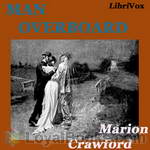 Man Overboard
Man Overboard
Peculiar happenings aboard the schooner Helen B. Jackson when one night during a storm, the small crew found themselves diminished by one. Somebody had gone overboard, and it was surmised that it was one of the twin Benton brothers. But oddly enough, it seemed that the ‘presence’ of the missing twin continued to exist on board during the following weeks. For example, one extra set of silverware was found to be used after each meal, but nobody claimed to be using them. What then did happen that stormy night, and which brother, if indeed it was one of the brothers, was the man who went overboard? | |
By: F. Tennyson Jesse (1888-1958) | |
|---|---|
 The Milky Way
The Milky Way
The Milky Way - F. Tennyson Jesse's first novel - began life as a 1913 magazine serial called The Adventures of Viv. In it, poor-but-plucky Cornish painter/model Vivian Lovel recounts events of her twenty-first year: en route from Penzance to London by steamer, she catches a baby dropped over the side of a sinking ship - and decides to keep it. Penniless, however, she "platonically" pairs up with pan-like fellow passenger Peter Whymperis, an actor and aspiring writer, and together they find work with a fifth-rate repertory troupe... | |